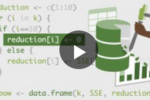Master of Science in Data Analytics
The ability to analyze data and make strategic decisions is critical to success in the modern workplace. The MSc in Data Analytics from Nexford empowers you with the technical and data skills needed to lead organizations and unlock the true potential of data. Become a master of data analysis and shape the future of your career.

Increase Impact
The skills you develop during the MSDA program will transform your career path. With new knowledge and skills, you will add immediate value to organizations you support and drive influence in strategic decision-making.
Ranked #1: Analytical Thinking
The World Economic Forum's Future of Jobs Report (2023) ranks Analytical Thinking as the top skill organizations will prioritize from 2023 through 2027.
Source: World Economic Forum (2023)
Why choose an MSc in Data Analytics
Become a Top Candidate for High-Demand Roles
There is a pressing demand for data analytics skills, but there needs to be more qualified individuals to fill the open roles. By obtaining a Master of Science in Data Analytics, you can acquire technical skills and business acumen to transition from an individual contributor to a leader. Gaining these skills and expertise will help you become a highly desirable candidate for new opportunities and professional growth.

What You Will Learn
Big Data
Develop skills in managing, designing, and architecting large datasets to enable cross-functional teams to efficiently access and retrieve information for their work areas.
Modern Tools
Build mastery in complex data analysis using advanced technologies such as SQL, Python, and R. Develop expertise in selecting the most suitable tools for each project.
Machine Learning
Apply machine learning and predictive modeling to real-world scenarios and gain valuable skills and experience to influence strategic decision-making.
Data Visualization
Learn how to present complex information in a simple way that non-technical team members can understand and use.
Join A Global Community of Technology Innovators
Education can be a powerful tool to advance your career. Nexford graduates are known for being digital natives who drive innovation and lead change in their organizations. With a new MSc degree and acquiring the most in-demand skills, you will join a powerful community of graduates and gain access to new opportunities and future career growth.

Duration
Complete an MSDA in an average of 18 months or less. The faster you finish, the more money you’ll save.
Effort
10-15 hours per week which fits into your work schedule so you can earn while you learn.
Format
Learner-centric, mission driven, 100% online, offering a next-generation learning experience. Regardless of physical location.
Cost
From ( for 18 months)
MSc Degree in Data Analytics: Program Courses
The Master of Science in Data Analytics (MSDA) program combines data mining, programmatic data analysis, statistical modeling, and data visualization courses with a solid foundation of soft skills and business education to transform learners into data-driven decision-makers and leaders.
This course introduces programming with R and Python for data analysis and business analytics. Master the fundamentals of two powerful programming languages, R and Python, to effectively manipulate, analyze, and visualize data. Learn essential concepts such as variables, loops, functions, and data structures in Python while exploring R's statistical and graphical capabilities. Develop your skills through hands-on exercises and real-world examples, and gain the confidence to tackle complex data challenges. By the end of this course, you will be proficient in R and Python and ready to leverage their capabilities for data-driven decision-making in various industries and applications.
Data Modeling and Mining provides you with an opportunity to learn about data mining methods and applications. In this course, you will learn basic concepts and tools for data mining, including data sources, data cleaning tools, methods, mainstream algorithms for data mining, statistical modeling, and popular tools for mining structured data and unstructured data. You will also learn how data mining can be effectively used in various application areas and industries to drive decisions and actions. Additionally, you will be provided with various opportunities to demonstrate your abilities in data modeling and mining by using the tools introduced in this course.
This course is designed to provide learners with a deep understanding of the core principles, techniques, and applications of machine learning in the context of data-driven analytics. The course focuses on equipping students with the knowledge and skills required to develop, implement, and evaluate machine learning models that can be used to solve complex real-world problems in various industries, such as finance, healthcare, marketing, and supply chain management. Learners will explore a range of machine learning algorithms, including supervised and unsupervised learning techniques, reinforcement learning, and deep learning frameworks. They will also learn how to preprocess and analyze data, select appropriate features, and optimize model performance using evaluation metrics and validation strategies. Additionally, the course will cover ethical considerations and best practices in developing and deploying machine learning models.
In this comprehensive and hands-on course on data visualization and communication, learners will master the art of transforming complex data into clear, compelling visual representations. Through a blend of theoretical concepts and practical exercises, learners will gain knowledge on the principles of effective data visualization, explore various visualization techniques and tools, and gain proficiency in selecting the right visualizations to convey their message. Additionally, students will delve into the psychology of visual perception and learn how to create impactful visual narratives that resonate with diverse audiences. By the end of the course, learners will possess the skills and confidence to create visually stunning and informative data visualizations, enabling them to effectively communicate insights and drive informed decision-making in any field or industry.
This course offers a comprehensive understanding of the rapidly evolving field of IT's legal and ethical aspects, exploring the interplay between technology, law, and ethics. Topics covered include intellectual property rights, data privacy, cybersecurity, digital rights management, social media, artificial intelligence, and the societal impacts of emerging technologies. We'll also delve into ethical considerations and legal frameworks guiding IT decision-making. Join us to navigate this dynamic landscape while upholding legal and ethical principles.
What is the number one job skill American and global employees are lacking, according to LinkedIn CEO, Jeff Weiner? Communication. The Art of Communication is designed to strengthen and promote a leadership-driven communications model that extends from an audience centered communications approach. How do leaders persuade shareholders? How do leaders negotiate with clients and business partners across cultures?
This course introduces learners to a foundation in rhetorical awareness that will transfer through a variety of contexts, including corporate communications, public speaking, negotiation, and a range of executive leadership scenarios. Coursework includes genre analysis, professional writing, presentation design and delivery, and negotiation workshops.
Learn the foundation of how to apply advanced analytics skills to complex data analysis and modes. You’ll build an understanding of design, data analytics tools, and advanced analytics translators to communicate complex data-related requirements between data engineers, business, and IT stakeholders.
The course examines four major areas; the momentum gains in the data and analytics revolution; the five elements of successful data analytics transformation; the mapping value in data ecosystems, and data analysis; the models of distribution.
This course provides students with a comprehensive understanding of statistical principles and their application in the field of business analytics. Through a combination of theoretical concepts and practical exercises, students will develop the skills necessary to collect, analyze, and interpret data, enabling them to make informed decisions in a data-driven business environment. Topics covered include probability theory, descriptive statistics, hypothesis testing, regression analysis, and data visualization. By the end of the course, students will be equipped with the knowledge and tools to utilize statistical techniques effectively, communicate insights to stakeholders, and contribute to data-informed decision-making processes.
Accounting and Financial Reporting engages learners in applying the principles of corporate finance and accounting to business decision making.
Course topics include financial statements and other reports, the basics of financial forecasting and budgeting, accounting analytics, and the communications and vocabulary related to financial statements. Learners reconcile financial transactions and accounting records, and examine the implications of international differences in accounting frameworks and financial reporting requirements.
Before the year 2000, environmental management for a business was typically driven by the need to respond to restrictions imposed by environmental regulation; however, at the dawn of the new millennium, leading businesses began to change their concept of environmental management to look beyond simply meeting governmental dictates. These organizations began to evolve and utilize environmental strategy to create new ways of growing their business by bringing sustainability to the core of their business strategy.
This course explores how to effectively work in senior management today, executives need to be knowledgeable not only about their specific business functions, but also, how their business will be impacted by governmental regulations & policies, corporate sustainability initiatives, green marketing regulations, industry guidelines or ‘best practices’, new sustainable technologies, energy planning, environmental performance metrics, and required reporting on the environmental impact of their business unit.
Analytics focuses on discovering the power of data-driven decisions in the competitive business landscape, harnessing the potential of their data in driving growth. The concepts in business analytics, such as data collection, data visualization, and statistical analysis, can be applied in the transformative journey of a data-driven organization. The course exposes learners to different analytical tools and techniques to be used to solve complex business problems, identify trends, and predict future outcomes. By mastering these essential skills, learners will become invaluable assets to any organization in any vertical looking to make data-driven decisions.
The Business Analytics Capstone Project is an immersive, project-based learning experience that allows learners to apply what they’ve learned throughout the business analytics studies about how to make data-driven decisions to real business challenges organizations face. Throughout the course, the learner will tackle real-world business problems in several verticals, such as marketing, finance, operations management, human resources, and organizational management. The learner will utilize data-driven decision-making techniques, cutting-edge analytical tools, and strategic thinking. This capstone course will challenge learners to synthesize their understanding of data visualization, predictive modeling, and machine learning while honing their communication and presentation skills. By the end of the course, they’ll be better prepared to make better data-driven business decisions in the ever-evolving field of business analytics.
Careers: In-Demand Jobs
Data Analytics Manager
Data Analytics Managers oversee data collection, processing, modeling, and analysis. In this role you identify solutions from complex data sets and converts insights into strategic opportunities for a company.
Supply Chain Analyst
Leverage predictive analytics, problem-solving, and a range of business skills to forecast demand and facilitate the efficient functioning of the supply chain.
Data Scientist
Apply statistical modeling, machine learning, and analytical business skills to manage big data and extract valuable insights to influence business strategy and execution and drive innovation.
Director of BI
As Director of Business Intelligence (BI), you'll manage data assets and be responsible for data availability, accuracy, and integrity. Deep knowledge of data management and strong leadership skills are critical to aligning teams in data-driven decision-making.
Chief Information Officer
Take charge in shaping and executing an organization's technology and information strategy to successfully achieve business objectives while effectively managing risks and ensuring competitive advantage.
Real-World, Job-Ready
95% of our learners gained valuable skills at work
Nexford's MSc in Data Analytics program is designed for highly motivated individuals ready to achieve their professional potential. To build our programs, we analyzed 30 million jobs and surveyed industry leaders – including those from Microsoft, Citibank, and Unilever.

Access: LinkedIn Learning
Nexford learners have access to LinkedIn Learning at no additional cost. Complete courses, earn badges — and share with your LinkedIn network.

Power BI
Use Power BI to model data and create data visualizations.

Analytics Certificate
Earn a Certified Analytics Professional (CAP) credential.

Predictive Analytics
Use big data to tell your customer's story.

ML, R and Excel
Overview of machine learning and data reduction techniques

ML Foundations: Statistics
Learn how to use statistics to gain insights into data
Career Services: Start With The End in Mind
At Nexford, you'll do more than learn. Alongside your studies, you'll receive access to all of our career services, beginning when you enroll and ending... well, never.
Your career growth and success are at the heart of everything we do, so you'll come away from Nexford with more than just a degree.

Why Learn at Nexford
At Nexford we have reimagined the university experience, torn down the walls of the traditional campus, and designed a modern learning experience.
Career Success
At Nexford, your career success is our top priority. Our advisors provide personalized 1:1 support, and our career services guide your growth. Join us for a pathway to a thriving career.
Workplace Alignment
Our course design includes hands-on projects relevant to your career, allowing you to apply new skills immediately. The degree you earn aligns with the skills needed today and in the future.
Intersection of Business and Technology
Our program blends business knowledge and technical skills for early-stage professionals. You'll gain proficiency, understanding, and Power Skills needed for leadership roles.
Global Networking
Join a global community from over 110+ countries, earn a valuable credential, and build a strong network with professionals from Fortune 500 companies to startups.

Admission Requirements
Transcripts
We need proof that you completed a bachelor’s degree at an accredited institution in a business-related field, including a course in basic statistics, with a valid copy of your official diploma and transcript. Documents not in English must be accompanied by official translations, such as those provided by a validated institutional official or embassy.
Please submit your university transcript during the application process in addition to your diploma, so it can be evaluated
-
If your Bachelor’s degree is in a business-related field - please submit your university transcript during the application process in addition to your diploma, so it can be evaluated. If you have not completed a Statistics course, you can still get a Nexford MSDA after completing our Statistics course.
-
If your Bachelor’s degree is not in a business-related field - you can still get a Nexford’s MSDA, although first you’ll have to complete a foundations program with one business course and one statistics course. For further details, please talk to our admissions team by contacting help@nexford.org.
At Nexford, we make translating your transcripts and diplomas easy. We offer an in-house translation service. This simplifies the process for you, so you can concentrate on finding your documents. Just leave the translation to us.
English Proficiency
To be considered for admission as English Language Proficient to the Nexford University MSDA program, applicants must complete one (1) of the following:
- Provide Nexford with: a. an official transcript from a college or university
- Demonstrate proficiency in English language by achieving at least a minimum passing score on an approved English qualification exam within the past two years, by submitting an official score report during the admission process. (see Minimum Score Required for English Proficiency)
Note: Admission Officers may request alternative supporting materials that might assist the university in certifying the applicant’s English proficiency status. All outcomes based on the supporting materials provided, will remain within the learners record according to the university records retention policy.
MSc in Data Analytics FAQ
How long is the program?
The average length of the MSDA program is 18 months. Learners can finish more quickly or slowly (up to 27 months) depending on how many courses they take each month.
What time commitment do I need to make?
Learners should expect to commit 10-15 hours per week per course in the MSDA. The max duration for a course is 8 weeks, but learners can move at a quicker pace if they like.
How much will it cost?
At Nexford, you’ll invest in your future, not a campus — and our monthly fees are calculated in line with your local economy, which ensures you never pay over the odds. Tuition costs vary by market — so see what an online MSDA at Nexford will cost in your market here.
Is there a class schedule?
Nexford programs are completely online and self-paced, within the maximum allowable time per course. Each course has 1 or 2 live sessions with the instructor, but those sessions are recorded and can be viewed at the learner’s convenience. Course assignments must be completed by the specified due dates, but there is otherwise no defined class schedule.
What courses are included in the program?
The MSDA program offers courses in Business, Data Analysis, Statistcs, and Machine Learning, providing learners the technical skills and business acumen necessary to launch a successful career in data analytics and technology. Learners will acquire a comprehensive understanding of key programming languages and data analysis tools and techniques, enabling them to make data-driven decisions and formulate effective recommendations for businesses.
Courses include:
Business Analytics
The Art of Communication
Programming in R & Python
Data Modeling & Mining
Accounting ad Financial Reporting
The Law & Ethics of Information Technology
Statistics for Business Analytics
Data Sciences for Decision Making
Information Visualization & Communication
Corporate Sustainability
Applied Machine Learning for Business Analytics
Business Analytics Capstone
What projects will I work on?
The MSDA, like all other Nexford programs, is a competency-based program, and as such, all courses include practical projects based on real-world scenarios in the field of digital transformation, such as:
- Deriving insights from banking data and presenting those insights in a compelling visual presentation
- Working with a big data set to clean the data, analyze it, run analytic models, and provide recommendations for action on a marketing problem
- Selecting and train a machine learning model to solve a pressing business problem
Additionally, all learners in the MSDA program will complete the Business Analytics Capstone, culminating in a final project in which learners will develop a model to optimize product pricing based on demand elasticity, competitor pricing, and customer preferences and create a video and Powerpoint presentation to convey your recommendations. Learners will have a comprehensive project, including a deployed machine learning model, a business analytics-ready dataset, and a business presentation, for their portfolio.
What qualifications will I receive?
Learners will receive a Masters of Science degree in Data Analytics from a DEAC-accredited university.
What skills will I gain?
- Database Management
- Data Mining & Modeling
- Data Analysis & Visualization
- Competency with programming languages for working with data: SQL, R, and Python
- Competency with Excel, RStudio, PowerBI, and other data analysis tools
- Machine Learning
- Statistical and Descriptive Analysis
- Critical Thinking & Problem Solving
- Presentation Skills
- Leadership & Influencing
- Strategic Decision-Making
What jobs will those help with?
The MSDA prepares learners for a career in data analytics or in business and technology. The degree focuses on skills necessary to drive business decisions and generate value for businesses through the analysis of data. These skills are in demand in every business vertical. Jobs in this career path include:
- Business Intelligence Analyst
- Data Analyst
- Product Manager
- Data Scientist
- IT Business Analyst
- Systems Analyst
- Data Architect
- Chief Information Officer (CIO)
- Chief Technology Officer (CTO)
What is the earning potential of those jobs?
Business analytics careers, such as business or data analysts, are highly sought-after with average starting salaries of approximately US$70,000 worldwide, depending on the role. With further work experience in the field, there are numerous opportunities for advancement up to and including executive positions. The most lucrative jobs, such as a CIO or CTO, range from $200,000 to $1-2 million, dependent on the individual's expertise and the size of the company. Ultimately, a career in business analytics offers great potential for career growth and high-paying jobs, regardless of a person's location or market.
Who will teach me?
Nexford courses are taught by our professors, who are not only academics but also working professionals in their industries. Nexford learners are driven and self-motivated, and they progress through their courses independently with guidance and support from the course professor and the course facilitator. Each course includes 1-2 live sessions, as well as other opportunities for interaction with the faculty, including discussion boards, WhatsApp and Discord chats, email, and scheduled office hour meetings.
What learning support will I get?
Nexford offers comprehensive support to our learners, ranging from Success Advisors who provide guidance on academic planning, enrollment, time management, and other student or working-adult related matters, online Librarians, course instructors, facilitators, and Peer Mentors. Furthermore, learners can connect with each other for support via our WhatsApp communities.
What career support will I get?
Nexford programs are designed to equip learners with career-growth skills. Additionally, a dedicated course – Career Strategies for Success – provides guidance on building a personal brand, developing a career strategy, and executing that plan. Our Career Services team offers workshops and webinars to support learners in critical areas such as networking, CV/resume building, and creating a LinkedIn profile. To further promote career development, many Nexford courses offer virtual internship experiences.
What are the admission requirements?
Transcripts
Applicants must submit proof that they have completed a bachelor’s degree from an accredited institution in one of the following fields, as well as the specified foundation courses for each:
- Bachelor’s degree in Business Administration or related field with a course in basic Statistics OR
- Bachelor’s degree in Business Administration without a course in basic Statistics: Complete STA1300 OR
- Bachelor's degree with no basic Statistics course: Complete BUS5002 Business Concepts with a minimum of a C or better and STA1300 Statistics
- Bachelor's degree with a basic Statistics course: Complete BUS5002 Business Concepts with a minimum of a C or better
*These courses must be completed with a minimum of a C or better
English Proficiency
To be considered for admission as English Language Proficient to the Nexford University MSDA program, applicants must complete one (1) of the following:
- Provide Nexford with: a. an official transcript from a college or university
- Demonstrate proficiency in English language by achieving at least a minimum passing score on an approved English qualification exam within the past two years, by submitting an official score report during the admission process. (see Minimum Score Required for English Proficiency)
Note: Admission Officers may request alternative supporting materials that might assist the university in certifying the applicant’s English proficiency status. All outcomes based on the supporting materials provided, will remain within the learners record according to the university records retention policy.
Is the MSDA program accredited?
Nexford is accredited by DEAC, which has reviewed and approved the MSDA program.